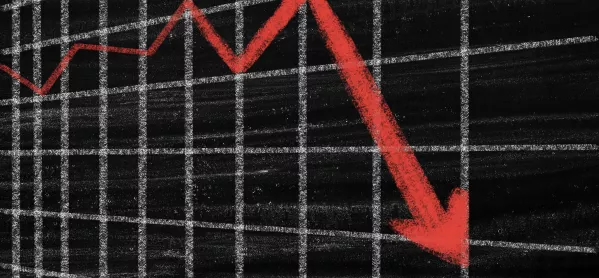
ITT applications fall by 23%

The latest data on initial teacher training shows that applications are down by 23 per cent compared with last year, prompting one sector leader to warn that “pandemics or recessions” cannot be relied upon to ensure a high-quality supply of teachers.
The data from the Department for Education shows a total of 32,016 applications from September to December 2021, a significant drop from the 41,520 recorded by Ucas over the same period in 2020.
In November figures had revealed that teacher training applications had dropped to pre-Covid levels, and this appears to be continuing.
- Teacher supply: Teacher training applications drop to pre-Covid levels
- Teacher training: Covid surge in ITT applications ‘could be over’
- Retention: Three key changes needed to keep new teachers in education
Teacher training applications had previously “surged” in 2020 during the economic downturn of the coronavirus pandemic, reaching an average of 566 applications a day in January 2021.
Reacting to the latest figures, which were published last month, Professor Sam Twiselton, director of Sheffield Institute of Education at Sheffield Hallam University, said: “We certainly shouldn’t and cannot rely on pandemics or recessions to secure a sufficient high-quality supply of teachers.
“More needs to be done to enable all those who have the potential to become an excellent teacher to become one.”
Economist Jack Worth, from the National Foundation for Educational Research (NFER), said today that the wider labour market was continuing to recover rapidly and ITT applications had returned to pre-pandemic levels.
Teacher training: Call for DfE action to improve ITT numbers
“The boost to teacher supply resulting from the Covid-related recession no longer applies, so policy measures will be needed instead, particularly for secondary, where the demand for teachers continues to grow,” he added.
“A competitive uplift to teachers’ pay is needed to address the emerging recruitment and retention issues, as well as a continued focus on reducing teacher workload.”
Mr Worth said the policy measures he would recommend included an increase in teacher pay “that at least maintains competitiveness with the wider labour market, and ideally improves competitiveness to attract and retain more teachers”.
“Longer-term, other measures include bursary changes and other targeted measures for under-recruiting subjects, as well as a continued focus on non-financial factors, such as workload and flexible-working opportunities.”
Paul Whiteman, general secretary of school leaders’ union the NAHT, said: “NAHT warned at the time that the increase in applications to initial teacher training in 2020 during the height of the pandemic should be viewed with great caution.
“Experience from the 2008 economic recession suggested that as the pandemic eases and economic conditions improve, the rise in applications would melt away. Unfortunately, these predictions have proved to be true and applications are now back to pre-pandemic levels.”
Mr Whiteman added that the supply of new teachers was only “one part of the picture” and that he was “deeply concerned” about the impact of the number of teachers considering leaving the profession on future leadership supply.
“For far too long government policy has been focused on refilling the bath, rather than fixing the leak,” he said.
Geoff Barton, general secretary of the Association of School and College Leaders, said it was always likely that the boost in ITT applications would “prove temporary”.
“The trouble is that there is an underlying structural weakness in the teacher supply line, and particularly in certain subject areas, with too few graduates coming into the profession,” he said.
“This can make it desperately difficult to recruit maths, science and modern languages teachers, for example, and this is often most acutely felt in schools that face the greatest degree of challenge.
“The government is trying to address these problems through its plan to raise starting salaries to £30,000 and the Early Career Framework. However, it has to improve salaries in general after years of pay erosion, and it must also rethink its devotion to an excessively harsh accountability system which drives too much pressure and workload.
“Teaching remains a great job, but the government sometimes seems to have done its best to devalue and drain the joy out of the profession.”
The DfE has been contacted for comment.
You need a Tes subscription to read this article
Subscribe now to read this article and get other subscriber-only content:
- Unlimited access to all Tes magazine content
- Exclusive subscriber-only stories
- Award-winning email newsletters
- Unlimited access to all Tes magazine content
- Exclusive subscriber-only stories
- Award-winning email newsletters
You need a subscription to read this article
Subscribe now to read this article and get other subscriber-only content, including:
- Unlimited access to all Tes magazine content
- Exclusive subscriber-only stories
- Award-winning email newsletters
- Unlimited access to all Tes magazine content
- Exclusive subscriber-only stories
- Award-winning email newsletters
topics in this article



